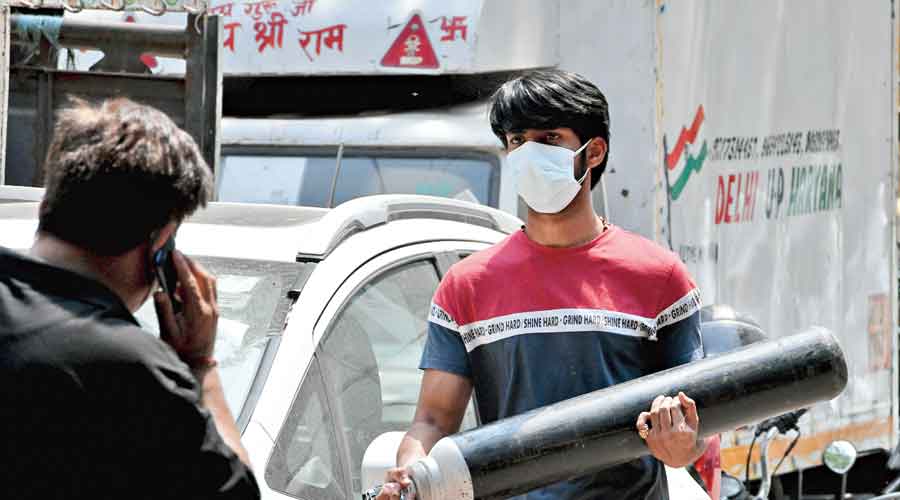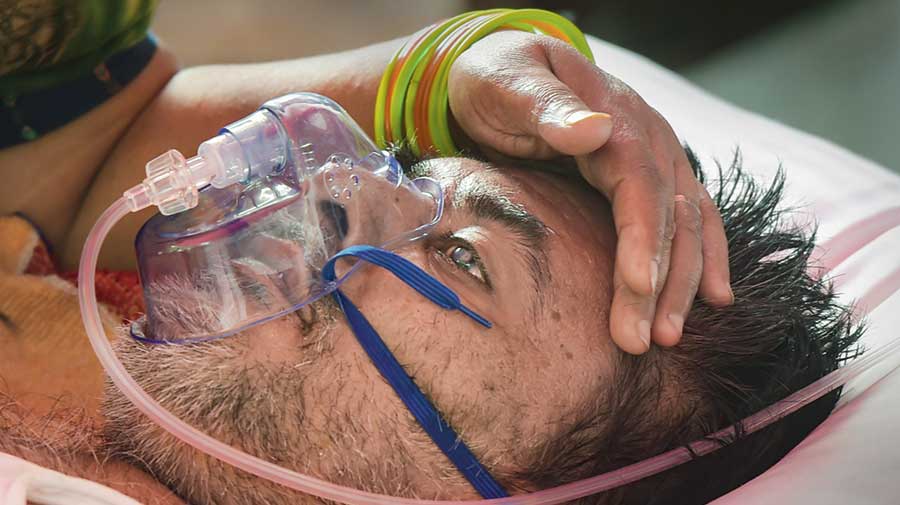At 9.45pm, alarms blared across the intensive care unit of Jaipur Golden Hospital. Over two dozen patients on ventilators couldn’t breathe. Some flailed their arms and legs. Others cried for help, choking sounds coming from their throats as if they were being strangled.
Mechanics sprinted to the maintenance room to see what was wrong. Nurses grabbed small plastic pumps to fill the lungs of critically ill patients by hand.
It wasn’t enough. Jaipur Golden, a respected hospital in Delhi, had run out of medical oxygen. Over the next seven hours, 21 coronavirus patients died.
“Nobody can forget that night,” said Shaista Nigar, the hospital’s nursing superintendent. “It was a total breakdown.”
Across India, amid a devastating second wave of Covid-19, hospitals ran out of beds and critical supplies, contributing to the deaths of untold thousands of people and worsening an already tragic outbreak.
India’s leaders knew the country was vulnerable. Yet the Narendra Modi government and local officials alike failed to prepare for the second wave, according to interviews and a review of government documents by The New York Times.
India is a major producer of compressed oxygen. But the Indian government moved too late to distribute supplies.
State governments feuded over oxygen and seized tankers, creating bottlenecks and delays.
When tight supplies and government missteps led oxygen to run out at Jaipur Golden, some families said the hospital offered no warning.
Without a comprehensive coronavirus plan, Modi’s government has left much of the burden to states, cities, hospitals and even individuals. The oxygen crisis tragically revealed the limits of a do-it-yourself approach.
That approach will be tested again. Though infections have dropped, a vaccine shortage puts India at risk of a third wave. Without adequate preparations, the second wave’s tragedies could return.
“With an effective surge plan,” said Robert Matiru, a director at Unitaid, a health initiative affiliated with the World Health Organisation, “this could have been averted.”
A crisis brews
Anuradha Bansal had a 102-degree fever when she checked into Jaipur Golden on April 13. A veteran schoolteacher, Bansal had tested positive for Covid-19, along with her husband, Atul, and their two daughters.
Jaipur Golden had a good reputation. A four-storey private hospital, it offered specialities like orthopaedics and paediatric gastroenterology. Its motto was “We Care… With Care”.
But Anuradha was shocked by the crowds filling Jaipur Golden and other hospitals in Delhi. Sick people packed the reception area, some leaning against the walls. In her Covid-19 ward, she said, extra beds had been squeezed in.
Atul, a lawyer, was lying on his back in the ICU down the hall, a plastic oxygen mask strapped to his face. He had been healthy for his 54 years, a strong swimmer who could hold his breath for minutes and ate a wholesome diet of beans, whole grain flour and yoghurt.
Though the tragic experiences of other places, like Egypt, showed what happens when oxygen runs out, India was still unprepared.
By April 20, Jaipur Golden was overstretched and undersupplied.
“My father was seething from inside,” said Rohit Gupta, a sales manager in Delhi whose father, Satish Kumar Gupta, had been admitted to the ICU in early April. Rohit said his father soiled the bed because nobody helped him go to the bathroom.
Rohit said his father cried out: “Take me away from here.”
The hospital declined to comment.
Breakdown
On April 23, all 250 beds were full. Outside the emergency room, patients slumped in wheelchairs waited to be admitted.
Seema Awasthi, a school principal from north Delhi, was propped up on her ICU bed, a ventilator feeding her lungs. At 8.45am, she sent a text to her family: “I have to be fine soon. Trying to be strong.”
That same morning, Modi huddled with the chief ministers of India’s 10 hardest-hit states.
“We fear a big tragedy may happen due to the oxygen shortage and we will never be able to forgive ourselves,” Delhi chief minister Arvind Kejriwal told him on the video call.
Jaipur Golden typically received its daily oxygen shipment by 5pm, said Dr D.K. Baluja, its medical director. This time, though, the truck didn’t appear. At Inox, an oxygen supply company, nobody picked up the phone.
Contacted by The Times, Inox said it distributed oxygen “as per government of Delhi’s instructions”. Delhi officials said they would supply records for April 23 but then did not.
At 7pm, Dr Baluja called Delhi’s oxygen command centre. Officials said they had none.
Jaipur Golden was nearly out. But employees and families said they had not been told. Some family members said they would have sought canisters on Delhi’s streets had they known.
Around 7pm, Anuradha was summoned to the ICU. Her husband, Atul, had suffered a heart attack. The oxygen levels on his ventilator were fluctuating. He was writhing in his bed, gasping for air.
“I couldn’t bear to watch,” she said. She left.
At 9.45pm, ventilator alarms rang across the ICU. The oxygen was gone.
Dr Baluja later said that Jaipur Golden had a backup system of 50 oxygen cylinders. That ran out, too, he said.
At 10.28pm, Ruchika Gupta telephoned from Amsterdam to check on her father, Satish Kumar Gupta. Right after the phone was answered, the receiver was put down.
“Hello? Hello?” Ruchika asked.
No response
In the background, she could hear the ding-ding of the ventilator alarms and someone muttering “Hari Om, Hari Om, Hari Om”, invoking God.
“My father was probably dying at that moment,” Ruchika said.
Rohit Gupta, her brother, arrived at Jaipur Golden around 11.30pm. It was chaos, he said. People dashed in carrying oxygen cylinders. Distraught relatives threatened to kill doctors. One man paced around shouting: “I will not leave these doctors alone if something happens to my mother!”
Two tankers arrived close to midnight: a large one from Inox, seven hours late, and a smaller one from the Delhi government.
For 21 patients — Atul Bansal, Satish Kumar Gupta, Seema Awasthi, Atul Kapoor, Raj Kumar Gupta, Gurinder Singh, Parvinder Singh, Delphin Massey, Manohar Lal and 12 others — it was too late.
Aftermath
The next morning, Dr Baluja appeared on television, weeping.
“They were my patients. They were my responsibility. They came on the faith of Dr Baluja to Jaipur Golden Hospital,” he said. “And where did I put my faith? The government of India. Delhi government.”
Jaipur Golden, now facing a lawsuit from several families, declined to comment further.
Many of the families blame national, local and hospital officials for the deaths. Several are demanding a criminal investigation.
Anuradha keeps a portrait of her husband by her bedside.
“I miss him at every living moment,” she said. “They killed him.”
New York Times News Service












